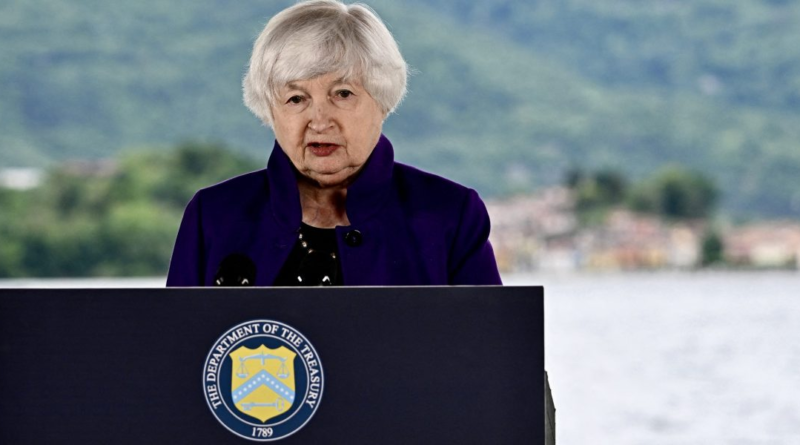Janet Yellen warns higher outlook for rates will make it harder to keep deficits and debt expenses under control
Treasury Secretary Janet Yellen said the outlook for higher interest rates over the long haul makes it tougher to contain US borrowing needs, heightening the importance of boosting revenue in negotiations with Republican lawmakers.
“We’ve raised the interest-rate forecast,” Yellen noted Friday in an interview with Bloomberg News. “That does make a difference. It makes it somewhat more challenging to keep deficits and interest expense under control.”
Yellen was referring to the Biden administration’s budget proposals, which she said ensure that the nation stays on a sustainable fiscal trajectory. She reiterated her emphasis on the metric of inflation-adjusted interest payments compared with GDP. That ratio jumped the past year, but the White House sees it stabilizing at about 1.3% over the coming decade.
“I don’t have a hard-and-fast rule, but I would not like to see it drift above 2%,” she said, in her most specific comments yet on that guidepost. She’s previously said the administration’s forecasts generated “historically normal” debt costs.
By contrast, Goldman Sachs Group Inc. economists do see the ratio exceeding that tolerance zone— projecting net real interest payments reaching 2.3% by 2034. That was in new analysis released Wednesday. Five years ago, the bank’s prediction was at 1.5%.
Soaring interest rates are a key reason why the outlook has worsened. The Federal Reserve aggressively raised rates beginning in 2022 to combat inflation, making it more expensive for the government to service its debt.
In its latest annual budget proposal, the White House projected 10-year Treasury yields at 3.7% in the early 2030s — almost a full percentage point higher than the 2.8% seen in its proposal three years before. Treasury-bill rates, which closely track the Fed’s benchmark rate, have gone up by about half a percentage point in those longer-term projections.
“We have included a lot of deficit reduction measures in the budget in order to hold the interest expense at a level that we think is fiscally responsible,” Yellen said. She was speaking with Bloomberg News in Stresa, Italy, on the sidelines of a Group of Seven meeting for finance ministers and central bank governors.
“We’re going to be opening up a tax negotiation,” Yellen said, alluding to the looming legislative battle over tax cuts passed in 2017 under former President Donald Trump that are due to expire at the end of 2025.
While Trump has pledged to extend the cuts, President Joe Biden wants to preserve reductions only for those earning less than $400,000 a year. As for the revenue from tax cuts that aren’t extended, Yellen said in the interview that “some of it probably needs to be used” for deficit reduction.
Yellen said “it’s also going to be necessary” to pay for provisions that are extended through new revenue. One way to help fund that is implementing the global corporate minimum tax deal, she said. “You need to do more than that, but that’s a pay-for.” On Saturday, she said the US isn’t ready to sign the final version of that agreement.
Biden’s budget, released in March, also includes tax hikes on capital gains and on households worth at least $100 million, among a slew of revenue-raising proposals that Republicans oppose.
Furman’s Doubts
Yellen noted that, “if we were back in the zero interest world, and thinking that that was a long term sustainable situation,” the path for net federal interest costs would be lower.
Her views on where borrowing costs will settle over time have appeared to shift. Last October, she said “it’s perfectly possible that we will see longer-term yields come down,” as many underlying trends that had depressed them in the past were “still there.”
While many observers focus on the overall debt-to-GDP ratio, Jason Furman and Lawrence Summers of Harvard University in a 2020 paper argued that policymakers should look instead at keeping real net interest from rising above 2% of GDP. Summers, a former Treasury secretary, is a paid contributor to Bloomberg TV.
Furman, former White House chief economist in the Obama administration, said last year the 2% guidepost isn’t sancrosanct.
“It is based on looking at the experience in other countries, the historical experience in the United States, our gut instinct,” Furman said in an interview last May. “I’m not positive it’s right.”




